Danish drugmaker Lundbeck has agreed to spend $2.6 billion acquiring a young biotechnology company with an experimental brain medicine that could become a blockbuster product.
The acquisition, announced Monday, has Lundbeck paying $60 in cash for each outstanding share of Longboard Pharmaceuticals, a 54% premium to the biotech’s stock price Friday. The companies expect their deal to close before the end of the year.
Should it go through, the deal would hand Lundbeck a possible treatment for a series of rare brain disorders characterized by seizures and developmental delays. There are more than 20 types of these disorders, known as developmental and epileptic encephalopathies, or DEEs. And according to Lundbeck, they affect around 220,000 people in the U.S., half of whom don’t have an approved therapy to try.
Lundbeck thinks the answer to that problem lies in a Longboard drug called bexicaserin. The drug entered late-stage clinical testing last month for one of the more prominent DEEs, Dravet syndrome, and is also being evaluated against another, Lennox-Gastaut syndrome. But Lundbeck believes it has the ability to address all DEEs, and estimates the peak annual sales potential could reach $1.5 billion to $2 billion.
“This transformative transaction will become a cornerstone in Lundbeck’s neuro-rare franchise, with a potential to drive growth into the next decade,” said Charl van Zyl, the company’s CEO, in a statement.
Lundbeck plans on bexicaserin entering the market in late 2028. Keeping to that timeline will be important, since the main patent protecting the company’s top seller— the antipsychotic medication Rexulti — is set to run out the following year. Two of Lundbeck’s other main products, Abilify Maintena and Trintellix, face patent pressure as well.
In a presentation, the company noted how bexicaserin has patent protection until 2041. An additional selling point was its “compelling” effectiveness in mid-stage studies. The drug is designed to boost a protein that releases “GABA,” a neurotransmitter which calms the brain. Such an effect could be valuable for conditions where brain cells are overly excited, like various epilepsies.
Launched in late 2020, Longboard spun out from the immune system specialist Arena Pharmaceuticals, which soon after sold to Pfizer for about $6.7 billion. Longboard began with $56 million in funding, then raised another $80 million going public the next year.
It’s acquisition comes during a slow period of biopharmaceutical dealmaking. The third quarter was the weakest for bigger-ticket mergers and acquisitions since early 2022, according to a BioPharma Dive database. So far, 2024 has yet to see a deal worth more than $5 billion, which has occurred at least once in each of the past seven years.














